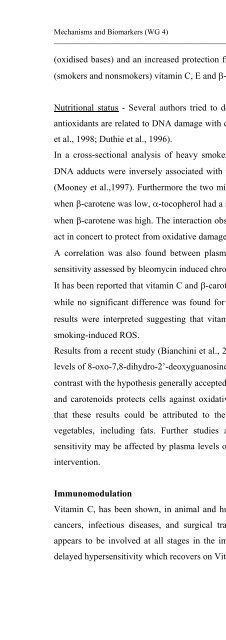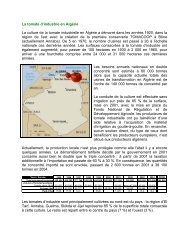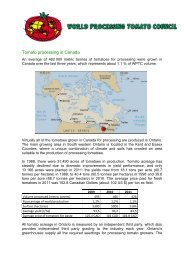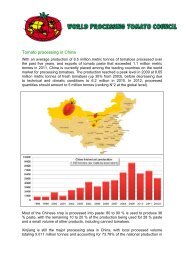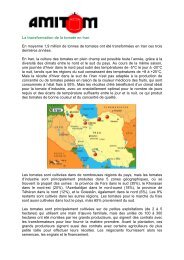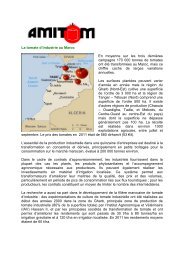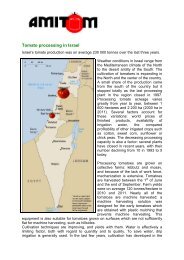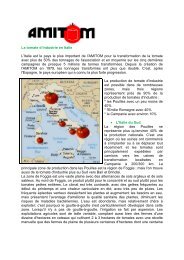- Page 2:
Introduction The European Commissio
- Page 6:
Composition of tomatoes and tomato
- Page 10:
Composition of tomatoes and tomato
- Page 14:
Composition of tomatoes and tomato
- Page 18:
Composition of tomatoes and tomato
- Page 22:
Composition of tomatoes and tomato
- Page 26:
Composition of tomatoes and tomato
- Page 30:
Composition of tomatoes and tomato
- Page 34:
Composition of tomatoes and tomato
- Page 38:
Composition of tomatoes and tomato
- Page 42:
Composition of tomatoes and tomato
- Page 46:
Composition of tomatoes and tomato
- Page 50:
Composition of tomatoes and tomato
- Page 54:
Composition of tomatoes and tomato
- Page 58:
Composition of tomatoes and tomato
- Page 62:
Composition of tomatoes and tomato
- Page 66:
Composition of tomatoes and tomato
- Page 70:
Composition of tomatoes and tomato
- Page 74:
Composition of tomatoes and tomato
- Page 78:
Composition of tomatoes and tomato
- Page 82:
Composition of tomatoes and tomato
- Page 86:
Composition of tomatoes and tomato
- Page 90:
Composition of tomatoes and tomato
- Page 94:
Composition of tomatoes and tomato
- Page 98:
Composition of tomatoes and tomato
- Page 102:
Composition of tomatoes and tomato
- Page 106:
Composition of tomatoes and tomato
- Page 110:
Composition of tomatoes and tomato
- Page 114:
Composition of tomatoes and tomato
- Page 118:
Composition of tomatoes and tomato
- Page 122:
Composition of tomatoes and tomato
- Page 126:
Composition of tomatoes and tomato
- Page 130:
Composition of tomatoes and tomato
- Page 134:
Composition of tomatoes and tomato
- Page 138:
Composition of tomatoes and tomato
- Page 142:
Composition of tomatoes and tomato
- Page 146:
Composition of tomatoes and tomato
- Page 150:
Composition of tomatoes and tomato
- Page 154:
Composition of tomatoes and tomato
- Page 158:
Composition of tomatoes and tomato
- Page 162:
Composition of tomatoes and tomato
- Page 166:
Composition of tomatoes and tomato
- Page 170:
Composition of tomatoes and tomato
- Page 174:
Composition of tomatoes and tomato
- Page 178:
Composition of tomatoes and tomato
- Page 182:
Composition of tomatoes and tomato
- Page 186:
Composition of tomatoes and tomato
- Page 190:
Composition of tomatoes and tomato
- Page 194:
Composition of tomatoes and tomato
- Page 198:
Composition of tomatoes and tomato
- Page 202:
Composition of tomatoes and tomato
- Page 206:
Composition of tomatoes and tomato
- Page 210:
Composition of tomatoes and tomato
- Page 214:
Processing and Bioavailability (WG2
- Page 218:
Processing and Bioavailability (WG2
- Page 222:
Processing and Bioavailability (WG2
- Page 226:
Processing and Bioavailability (WG2
- Page 230:
Processing and Bioavailability (WG2
- Page 234:
Processing and Bioavailability (WG2
- Page 238:
Processing and Bioavailability (WG2
- Page 242:
Processing and Bioavailability (WG2
- Page 246:
Processing and Bioavailability (WG2
- Page 250:
Processing and Bioavailability (WG2
- Page 254:
Processing and Bioavailability (WG2
- Page 258:
Processing and Bioavailability (WG2
- Page 262:
Processing and Bioavailability (WG2
- Page 266:
Processing and Bioavailability (WG2
- Page 270:
Processing and Bioavailability (WG2
- Page 274:
Processing and Bioavailability (WG2
- Page 278:
Processing and Bioavailability (WG2
- Page 282:
Processing and Bioavailability (WG2
- Page 286:
Processing and Bioavailability (WG2
- Page 290:
Processing and Bioavailability (WG2
- Page 294:
Processing and Bioavailability (WG2
- Page 298:
Processing and Bioavailability (WG2
- Page 302:
Processing and Bioavailability (WG2
- Page 306:
Processing and Bioavailability (WG2
- Page 310:
Processing and Bioavailability (WG2
- Page 314:
Processing and Bioavailability (WG2
- Page 318:
Processing and Bioavailability (WG2
- Page 322:
Processing and Bioavailability (WG2
- Page 326:
Processing and Bioavailability (WG2
- Page 330:
Processing and Bioavailability (WG2
- Page 334:
Processing and Bioavailability (WG2
- Page 338:
Processing and Bioavailability (WG2
- Page 342:
Processing and Bioavailability (WG2
- Page 346:
Processing and Bioavailability (WG2
- Page 350:
Processing and Bioavailability (WG2
- Page 354:
Processing and Bioavailability (WG2
- Page 358:
Processing and Bioavailability (WG2
- Page 362:
Processing and Bioavailability (WG2
- Page 366:
Processing and Bioavailability (WG2
- Page 370:
Processing and Bioavailability (WG2
- Page 374:
Observational epidemiological surve
- Page 378:
Observational epidemiological surve
- Page 382:
Observational epidemiological surve
- Page 386:
Observational epidemiological surve
- Page 390:
Observational epidemiological surve
- Page 394:
Observational epidemiological surve
- Page 398:
Observational epidemiological surve
- Page 402:
Observational epidemiological surve
- Page 406:
Observational epidemiological surve
- Page 410:
Observational epidemiological surve
- Page 414:
Observational epidemiological surve
- Page 418:
Observational epidemiological surve
- Page 422:
Observational epidemiological surve
- Page 426:
Observational epidemiological surve
- Page 430:
Observational epidemiological surve
- Page 434:
Observational epidemiological surve
- Page 438:
Observational epidemiological surve
- Page 442:
Observational epidemiological surve
- Page 446:
Observational epidemiological surve
- Page 450:
Observational epidemiological surve
- Page 454:
Observational epidemiological surve
- Page 458:
Observational epidemiological surve
- Page 462:
Observational epidemiological surve
- Page 466:
Observational epidemiological surve
- Page 470:
Observational epidemiological surve
- Page 474:
Observational epidemiological surve
- Page 478:
Observational epidemiological surve
- Page 482:
Observational epidemiological surve
- Page 486:
Observational epidemiological surve
- Page 490:
Observational epidemiological surve
- Page 494:
Observational epidemiological surve
- Page 498:
Observational epidemiological surve
- Page 502:
Observational epidemiological surve
- Page 506:
Table 38 Carotenoids and cataract O
- Page 510:
Observational epidemiological surve
- Page 514:
Observational epidemiological surve
- Page 518:
Observational epidemiological surve
- Page 522:
Observational epidemiological surve
- Page 526:
Observational epidemiological surve
- Page 530:
Observational epidemiological surve
- Page 534:
Observational epidemiological surve
- Page 538:
Observational epidemiological surve
- Page 542:
Observational epidemiological surve
- Page 546:
Observational epidemiological surve
- Page 550:
Observational epidemiological surve
- Page 554:
Observational epidemiological surve
- Page 558:
The Role of Dietary Tomato Products
- Page 562:
Mechanisms and Biomarkers (WG 4) pa
- Page 566:
Mechanisms and Biomarkers (WG 4) pa
- Page 570:
Mechanisms and Biomarkers (WG 4) pa
- Page 574:
Mechanisms and Biomarkers (WG 4) pa
- Page 578:
Mechanisms and Biomarkers (WG 4) pa
- Page 582:
Mechanisms and Biomarkers (WG 4) pa
- Page 586:
Mechanisms and Biomarkers (WG 4) pa
- Page 590:
Mechanisms and Biomarkers (WG 4) pa
- Page 594:
Mechanisms and Biomarkers (WG 4) pa
- Page 598:
Mechanisms and Biomarkers (WG 4) pa
- Page 602:
Mechanisms and Biomarkers (WG 4) pa
- Page 606:
Mechanisms and Biomarkers (WG 4) pa
- Page 610:
Mechanisms and Biomarkers (WG 4) pa
- Page 614:
Mechanisms and Biomarkers (WG 4) pa
- Page 618:
Mechanisms and Biomarkers (WG 4) pa
- Page 622:
Mechanisms and Biomarkers (WG 4) pa
- Page 626: Mechanisms and Biomarkers (WG 4) pa
- Page 630: Mechanisms and Biomarkers (WG 4) pa
- Page 634: Mechanisms and Biomarkers (WG 4) pa
- Page 638: Mechanisms and Biomarkers (WG 4) pa
- Page 642: Mechanisms and Biomarkers (WG 4) pa
- Page 646: Mechanisms and Biomarkers (WG 4) pa
- Page 650: Mechanisms and Biomarkers (WG 4) pa
- Page 654: Mechanisms and Biomarkers (WG 4) pa
- Page 658: Mechanisms and Biomarkers (WG 4) pa
- Page 662: Mechanisms and Biomarkers (WG 4) pa
- Page 666: Mechanisms and Biomarkers (WG 4) pa
- Page 670: Mechanisms and Biomarkers (WG 4) pa
- Page 674: Mechanisms and Biomarkers (WG 4) pa
- Page 680: Mechanisms and Biomarkers (WG 4) pa
- Page 684: Mechanisms and Biomarkers (WG 4) pa
- Page 688: Mechanisms and Biomarkers (WG 4) pa
- Page 692: Mechanisms and Biomarkers (WG 4) pa
- Page 696: Mechanisms and Biomarkers (WG 4) pa
- Page 700: Mechanisms and Biomarkers (WG 4) pa
- Page 704: Mechanisms and Biomarkers (WG 4) pa
- Page 708: Mechanisms and Biomarkers (WG 4) pa
- Page 712: Mechanisms and Biomarkers (WG 4) pa
- Page 716: Mechanisms and Biomarkers (WG 4) pa


